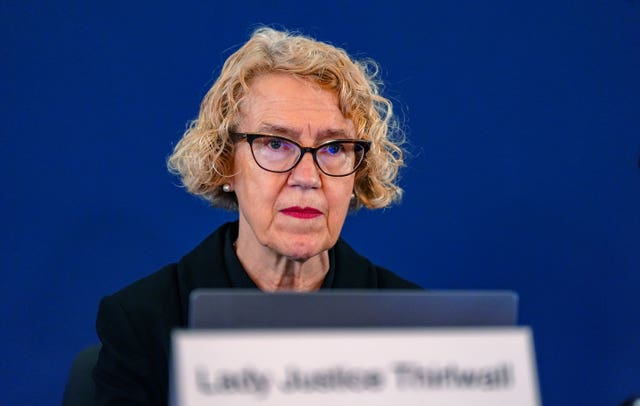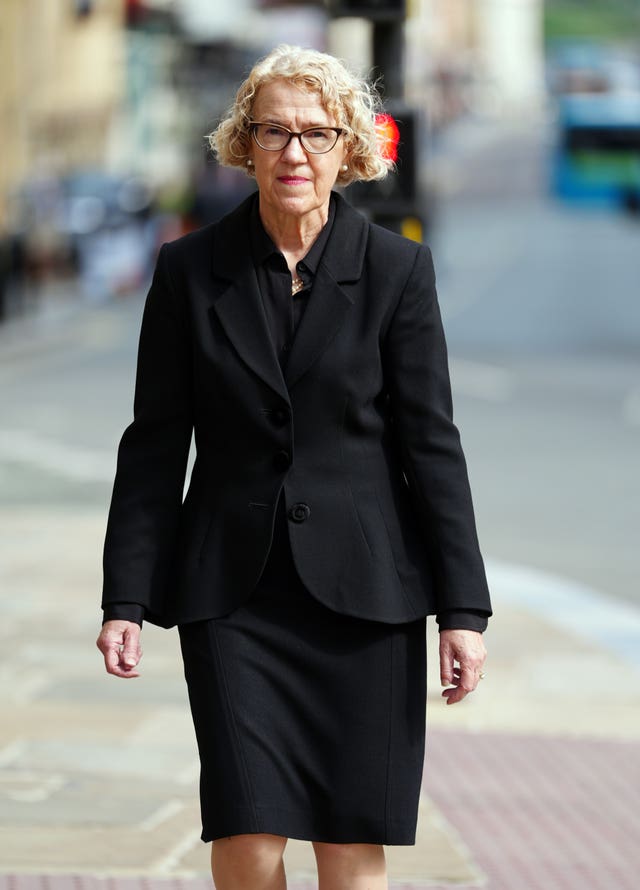Nurses were “thinking the unthinkable” that a rogue colleague could be deliberately harming babies just a few months into Lucy Letby’s year-long killing spree, a public inquiry has heard.
On Wednesday, Dr Rachel Lambie told the Thirlwall Inquiry surrounding the events of Letby’s crimes at the Countess of Chester Hospital she was “shocked” to hear neonatal nurses were checking rotas to see if there was a “common denominator”.
The incident took place shortly before Dr Lambie left her trainee doctor placement on September 1 2015, the inquiry heard.

Dr Lambie said: “I was walking through the intensive care unit and there was a huddle of nurses over the computer and I asked what they were doing and one of the nurses replied they were going through the rota just to make sure that there wasn’t somebody that was on for each one.
“I can’t recall precisely what she said but it was very much ‘it’s an awful thing to think but we are just looking’.
“I don’t recall saying anything but I remember being quite shocked and thinking ‘oh, I agree it’s an awful thing to think’. I mean it is the unthinkable but that’s what they were discussing.”
Counsel to the inquiry Rachel Langdale KC said: “By September 2015 it sounds like people were thinking the unthinkable, there may be a link to a person?”
Dr Lambie said: “Yes. So for me, personally, thinking the unthinkable in this case was there might be a person who is deliberately causing harm.”
Miss Langdale said: “So by their actions you are saying the nurses… were trying to look at a rota and seeing who is there for these specific events?”
Dr Lambie said: “It was starting to become part of their thought processes, yes.”
Miss Langdale went on: “You are clear that there was discussion about the unthinkable and looking for somebody as a common denominator?”
Dr Lambie replied: “Only among the nursing staff in that particular period, I don’t recall a conversation among the doctors or a suggestion it was one particular person by the time I left in 2015.
“Among the doctors there were established concerns that there was a series of events that were unusual, unexpected and serious and they were persisting.
“At that time we couldn’t explain what was happening but there was full appreciation that we needed to look into what was causing these events and this was not something that could be dismissed.”
She told the inquiry there were “increasing levels of anxiety” on the unit following the death of Child A and the collapse of his twin sister, Child B, in June 2015 due to the “unexpected and similar natures of their collapses and the appearance of a unusual rash”.

Dr Lambie said she was also concerned about a “very, very unusual incident” involving another infant that happened up to a fortnight before the death of Child A.
She said: “It was something I have never experienced before or since. I was already quite anxious going into Child A and B because I had that particular unusual event.”
The incident did not feature in Letby’s criminal case but Dr Lambie had made a statement to police about the matter, the inquiry was told.
Dr Lambie added that as babies became unexpectedly seriously ill, collapsed or died she recalled medical and nursing staff reporting to each other they were “nervous” at the start of their shifts.
She told the inquiry: “I certainly remember within our team at handover it was a regular topic of conversation.
“I remember on more than one occasion almost the heart-sinking feeling of ‘oh gosh, what’s going to happening today’.
“There was almost an air of anticipation of what’s going to happen.”
Following the death of Child P, a triplet boy, in June 2016, a then trainee doctor told a nurse: “Nurse Death’s on again.”
Dr Cassandra Barrett told the Thirlwall Inquiry: “I did say that. At the time I didn’t have any awareness of the suspicions among the consultant body with regards to Lucy Letby actively causing harm.
“Never did I think the unthinkable, as we mentioned earlier in the day, that somebody would be going to work to actively harm babies.”
Miss Langdale asked: “What association had you made about her though to say ‘Nurse Death’s on again’? ”
Dr Barrett replied: “I had noticed that she was there at a couple of the unexplained child collapse and deaths but I thought that was more about bad luck rather than her being the causative agent.”
Dr Huw Mayberry, who worked alongside Letby in 2016 as a registrar, told the inquiry he did not believe CCTV cameras would have stopped Letby harming infants.
He said: “I’m not sure it would have dealt with a lot of the ways in which she killed and it may have given false reassurance that things were right.”
It would be “hard to tell” from CCTV that someone was injecting air into babies’ bloodstreams, he said.
Dr Mayberry said: “One of the common syringes used to give children’s medications is a 1ml syringe, which is soft and made out of glass. At the point where that is filled with fluids it can sometimes be really hard to tell looking directly at it to see if there is fluid in it or is it filled with air.
“I’m not sure if you would be able to tell from a digital image further away.”
Letby, 34, from Hereford, is serving 15 whole-life orders after she was convicted at Manchester Crown Court of murdering seven infants and attempting to murder seven others, with two attempts on one of her victims, between June 2015 and June 2016.
The inquiry is expected to sit at Liverpool Town Hall until early next year, with findings published by late autumn 2025.




Comments: Our rules
We want our comments to be a lively and valuable part of our community - a place where readers can debate and engage with the most important local issues. The ability to comment on our stories is a privilege, not a right, however, and that privilege may be withdrawn if it is abused or misused.
Please report any comments that break our rules.
Read the rules here